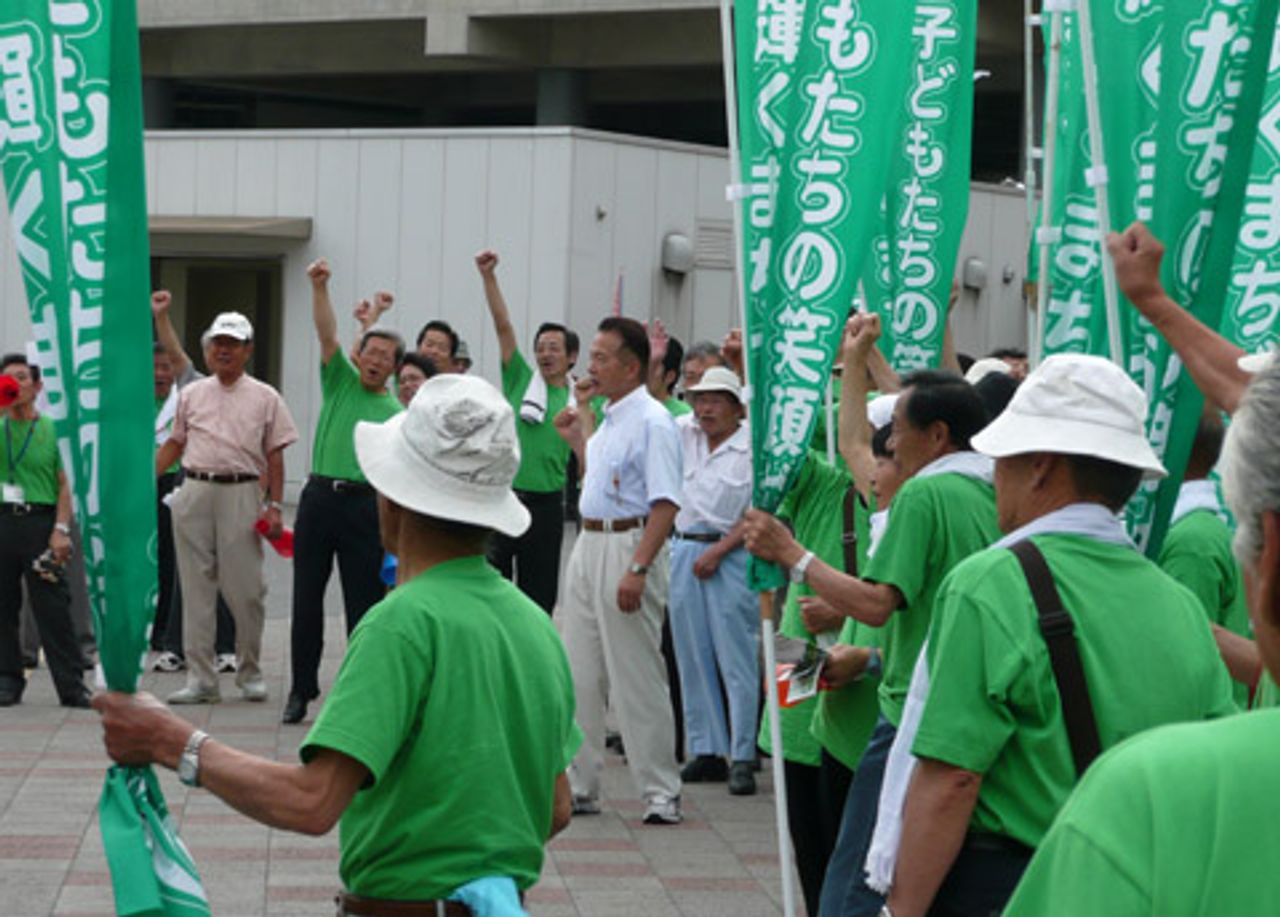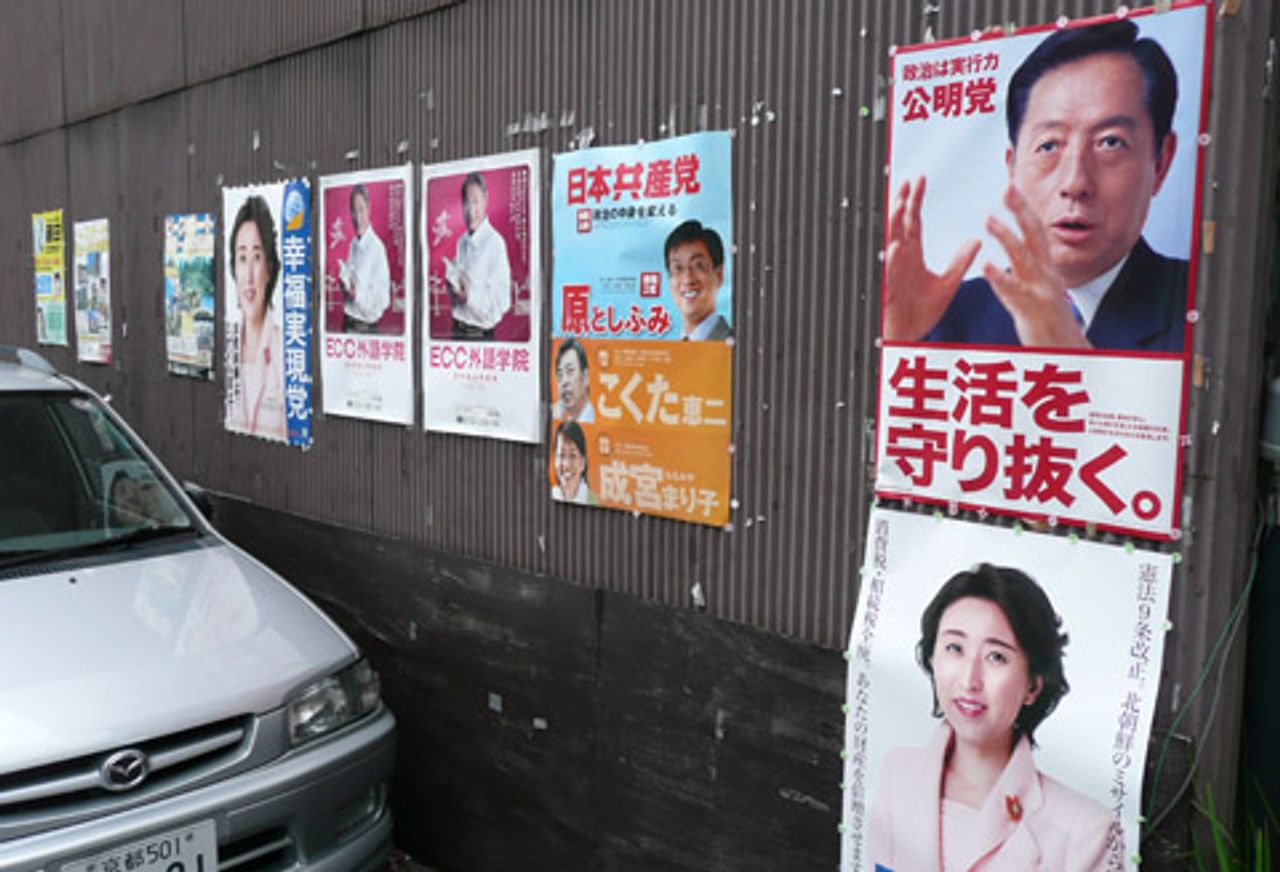Japanese Prime Minister Taro Aso formally dissolved parliament on Tuesday setting the stage for a general election on August 30. The ruling Liberal Democratic Party (LDP) heads into the election trailing behind the opposition Democratic Party of Japan (DPJ) in all the polls and facing an end to its virtually unbroken 53-year rule.
Aso’s decision to proceed with the election was in large measure aimed at pre-empting a revolt in the LDP’s ranks against his leadership in the wake of local elections on July 12. In what were billed as key tests, the LDP lost both the Tokyo Metropolitan Assembly election and the mayoral race in Nara to the DPJ.
 DPJ campaign in Nara local election
DPJ campaign in Nara local election
Last weekend a group of 135 LDP parliamentarians made a bid to convene a formal party meeting that would have had the power to replace Aso as leader. While Aso and his supporters managed to stymie the move, it nevertheless points to the deep and unresolved divisions within the ruling party. Among those rumoured to have backed Aso’s ousting was the influential finance minister, Kairu Yosano.
With just over a month to go before the election, the LDP is staring into the electoral abyss. Opinion polls last weekend all indicated that the LDP is likely to be defeated. A Kyodo News poll found that 39.3 percent of respondents were hoping for a DPJ government, while only 14.8 percent expressed a preference for the LDP. DPJ leader Yukio Hatoyama led Aso as preferred prime minister by 48.4 percent to 21 percent.
The figures reflect a longstanding alienation among voters not only with the LDP but with the entire Japanese political establishment. The LDP’s landslide win at the last general elections in 2005 did not contradict this trend. Rather Prime Minister Junichiro Koizumi was only able to defeat the DPJ by posturing as an anti-establishment figure, willing to stand up to conservative forces within his own party.
When his postal privatisation legislation was defeated in the upper house, Koizumi expelled LDP parliamentarians who had voted against the bill, called a snap election and stood high-profile “assassin” candidates against the rebels. By confining the campaign to a single issue, Koizumi drowned out widespread popular opposition to Japanese involvement in the US-led occupations of Iraq and Afghanistan.
As the social implications of Koizumi’s pro-market agenda became clear, his support began to wane as an unprecedented public debate opened up over deepening social inequality. Since Koizumi stood down as prime minister in 2006, the LDP has stumbled from one crisis to the next under a succession of short-lived leaders—Shinzo Abe, Yasuo Fukuda and now Aso—who represented a return to norm of conservative LDP politics. One of Abe’s first steps was to reintegrate the LDP rebels back into the party.
By contrast to Koizumi’s anti-establishment pose, Aso set the tenor of the election campaign on Tuesday by presenting the LDP as proven economic managers and defenders of Japan’s security. Accusing the DPJ of having no policies, he declared: “We cannot leave Japan’s economy in their hands. We cannot leave Japan’s security in the hands of a party without a security policy. Only the LDP can take responsibility for Japan’s future.”
 Election posters in Kyoto
Election posters in Kyoto
The LDP message, however, is unlikely to ring true with many voters. Despite Aso’s claims that his government’s stimulus packages are beginning to pay off, the Japanese economy remains mired in recession. Moreover, the present economic crisis is only compounding a more protracted decline since the early 1990s following the collapse of huge speculative share and property bubbles. According to the World Bank, the country’s per capita GDP has fallen from the third highest in the world in 1991 to 18th last year.
A decade of economic stagnation, followed by Koizumi’s accelerated economic restructuring, has opened up deep social divisions. The previous system of corporate life-long employment has been whittled away, leading to increasing numbers of workers, particularly young workers, in low-paid part-time and temporary jobs. As the economy plunged into recession last year, companies have laid off an estimated 216,000 short-term employees, sending the notoriously understated official jobless figure to a five-year high of 5.2 percent in May.
Speaking to the New York Times, Saburo Toyoda, a 54-year-old salesman, expressed the sentiments of many, saying: “Things have gotten so bad that you have to ask, ‘Can’t someone else do a better job?’... It is time for new ideas, and new faces.” Toyoda lost his lifetime job seven years ago and has been through a series of jobs that paid less than half his previous salary. He told the newspaper that he is fed up with Japan’s long malaise.
Shiho, a 23-year-old university graduate, explained to the New York Times that she was forced to work as a receptionist at a golf course, after the offer of a white-collar job with a large construction company was withdrawn last year. “I feel betrayed. I studied for university entrance exams, went to a good university, did everything I was supposed to do, and then this happened,” she said. Shiho said that she and her friends believed it was time for change in Japan, but were uncertain if they would even bother to vote. If she did, it would be for the DPJ.
The DPJ is hoping to capitalise on widespread anti-government sentiment by promising to provide childhood allowances, reimburse public school expenses, abolish road taxes, cut taxes for small and medium enterprises and provide income support for farming households. At the same time, the party has previously pledged to big business that it would implement a more aggressive pro-market agenda than the LDP. Questioned about how the party proposes to pay for its promises, the DPJ offers vague proposals to cut waste and to reform the state bureaucracy.
The lukewarm public support for the DPJ stems from the fact that it is very similar to the LDP in policies and even personnel. The party was formed in 1998 through an amalgamation of groupings that broke from the LDP and the Japanese Socialist Party over the previous four years. DPJ leader Yukio Hatoyama and many of the party’s prominent figures were previously LDP parliamentarians. One of Hatoyama’s brothers was a senior minister in Aso’s cabinet until recently.
While the DPJ may be riding high in the polls now, earlier this year support plummetted after party leader Ichiro Ozawa became embroiled in a scandal over election funding from a construction company. The issue was particularly damaging as it underscored the similarity of the DPJ to the LDP, which has relied for decades on its close relations with major corporations, particularly in the construction sector. The DPJ was finally forced to dump Ozawa in a bid to stem the political damage.
Aso has focussed attention on “security” and foreign policy to exploit differences inside the DPJ between the former LDP and JSP wings of the party. Both Ozawa and Hatoyama have appealed to widespread anti-war sentiment by opposing Japan’s naval refuelling support for the US war in Afghanistan and questioning the continued presence of American bases in Japan. In particular, the DPJ has criticised an agreement to relocate US Marines from the Japanese island of Okinawa to Guam as being too costly to Japan.
As the election approaches, DPJ leader Hatoyama has moved to soften the party’s stance. Asked last month about Japan’s refuelling mission, he said: “Continuity is required in diplomacy... Suddenly halting it would be a very reckless idea.” In an interview with Stars and Stripes this week, Keiichiro Asao, who may become defence minister in a DPJ government, suggested that while his party would end the refuelling of US and NATO warships it would consider other roles in supporting the US occupation. Any policy shift is likely to open up divisions in the DPJ particularly with former members of the JSP, which based itself on opposition to Japan’s alliance with the US.
Barring electoral surprises, the DPJ is likely to win the August poll, riding to power on the sentiment that, if nothing else, it represents the “lesser evil” as compared to the LDP. The defeat will have a profound impact on the LDP as bitter recriminations and suppressed differences rapidly emerge. Victory for the DPJ could well be just as destabilising as the loose coalition begins to implement the demands of big business, ditch its election promises and confronts growing disillusion and opposition from voters.
